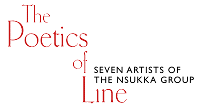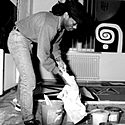
|
|
||

|
|
|
|
|
|
|
|
"In a recent letter Ulli Beier asks, 'Who is Olu Oguibe?' An artist! is the answer, not an Igbo or uliist or whatever else. No one asks 'who is Jeff Koons?' and David Hockney is not studied as a Cockney artist." |
|

photograph courtesy Olu Oguibe 
|
Olu Oguibe, who was born in 1964 in the southern Igbo city of Aba, received his first artistic experience from his father, a preacher, a former school teacher, a wood sculptor, and a sign painter. As happened to so many other of his countrymen, Oguibe's life was disrupted by the Biafran War of 1967-70, but his family survived intact, and the artist later took part in traditional artistic activities in his home Igbo community. Oguibe attended the University of Nigeria (1981-86), received his bachelor's degree, and undertook graduate work (1987-89) before he left for England due to the unsettled political situation in Nigeria. He remained in London for six years, where he earned his doctorate degree in art history from the School of Oriental and African Studies at the University of London. His dissertation on the Nigerian artist Uzo Egonu, who left Nigeria following World War II and lived in England most of his life, was published in 1995. In that same year Oguibe moved to the United States and taught briefly at the Chicago campus of the University of Illinois. He now teaches at the University of South Florida in Tampa. During his student days in Nigeria and his six years in London, Oguibe was often called "an angry young artist," a term that no longer seems to apply to him. His poetry and artworks produced from diverse media often reflect political and social issues as well as changes in his own life. In Nigeria, he painted on traditional mats, baskets, and cane meshes. In England he painted in watercolor and later acrylics. As he moves into the post-modern world of art, Oguibe's interests have recently shifted to installation art, through which he evokes the suffering of children and his own childhood experiences during the Biafran War. In turn, he has gradually ceased to draw upon uli and nsibidi designs, but he does explore the arts of other Third World countries, such as ancient Mexico, Aboriginal Australia, and the Near East, as well as the traditional flag designs of the Fante of coastal Ghana. He has now completely moved beyond the Nsukka tradition. An acclaimed poet, Oguibe has published three volumes of his writings, with the best known being A Gathering Fear (1992). He is also a respected scholar and historian of contemporary African and African American art. Intellectually eclectic, Oguibe's artistic style and creative intentions have changed radically over time. For further information, visit his webpage athttp://satie.arts.usf.edu/~ooguibe/index.html. |
|
|

|

|

|

|

|

|

|
|
|
Back to: NMAfA past exhibits |
||||||||